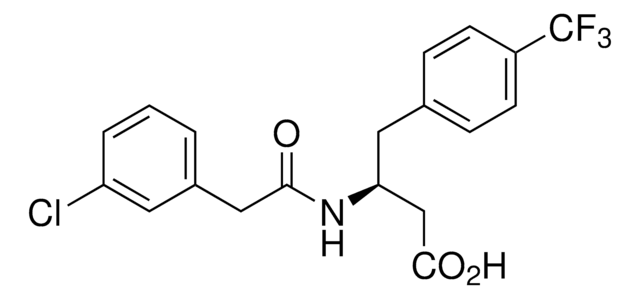371725
GPR43 (FFA2) Agonist
The GPR43 (FFA2) Agonist controls the biological activity of GPR43. This small molecule/inhibitor is primarily used for Biochemicals applications.
Szinonimák:
GPR43 (FFA2) Agonist, (S)-2-(4-chlorophenyl)-3,3-dimethyl-N-(5-phenylthiazol-2-yl)butanamide
Bejelentkezésa Szervezeti és Szerződéses árazás megtekintéséhez
Összes fotó(1)
About This Item
Tapasztalati képlet (Hill-képlet):
C21H21ClN2OS
CAS-szám:
Molekulatömeg:
384.92
UNSPSC kód:
51111800
NACRES:
NA.77
Javasolt termékek
Minőségi szint
Teszt
>98% (HPLC)
form
solid
gyártó/kereskedő neve
Calbiochem®
tárolási körülmény
OK to freeze
szín
white
oldhatóság
DMSO: 50 mg/mL
kiszállítva
ambient
tárolási hőmérséklet
2-8°C
Általános leírás
A phenylacetamide compound that acts as an allosteric agonist of FFA2 (GPR43), demonstrating a left-shifted acetate dose response (IC50 = 0.7 µM) and 111% efficacy relative to acetate in hFFA2 forskolin-induced cAMP assays.
Figyelmeztetés
Toxicity: Standard Handling (A)
Feloldás
Following reconstitution, aliquot and freeze (-20°C). Stock solutions are stable for up to 3 months at -20°C.
Egyéb megjegyzések
Wang, Y., et al. 2009. Bioorg. Med. Chem. Lett.20, 493.
Jogi információk
CALBIOCHEM is a registered trademark of Merck KGaA, Darmstadt, Germany
Tárolási osztály kódja
11 - Combustible Solids
WGK
WGK 3
Lobbanási pont (F)
Not applicable
Lobbanási pont (C)
Not applicable
Analitikai tanúsítványok (COA)
Analitikai tanúsítványok (COA) keresése a termék sarzs-/tételszámának megadásával. A sarzs- és tételszámok a termék címkéjén találhatók, a „Lot” vagy „Batch” szavak után.
Már rendelkezik ezzel a termékkel?
Az Ön által nemrégiben megvásárolt termékekre vonatkozó dokumentumokat a Dokumentumtárban találja.
Sandra M Holmberg et al.
Nature communications, 15(1), 3502-3502 (2024-04-26)
Beneficial gut bacteria are indispensable for developing colonic mucus and fully establishing its protective function against intestinal microorganisms. Low-fiber diet consumption alters the gut bacterial configuration and disturbs this microbe-mucus interaction, but the specific bacteria and microbial metabolites responsible for
Anne Ørgaard et al.
Islets, 11(5), 103-111 (2019-08-31)
The intestinal microbiota has been demonstrated to influence host metabolism, and has been proposed to affect the development of obesity and type 2 diabetes (T2D), possibly through short-chain fatty acids (SCFAs) produced by fermentation of dietary fiber. There are some
Signe Schultz Pedersen et al.
The FEBS journal, 291(3), 566-583 (2023-11-21)
Butyrate, a gut microbial metabolite, has beneficial effects on glucose homeostasis and has become an attractive drug candidate for type 2 diabetes (T2D). Recently, we showed that butyrate protects pancreatic beta cells against cytokine-induced dysfunction. In this study, we explored
Guangwen Wang et al.
Journal of virology, 94(2) (2019-11-07)
Influenza A virus (IAV) coopts numerous host factors to complete its replication cycle. Here, we identify free fatty acid receptor 2 (FFAR2) as a cofactor for IAV entry into host cells. We found that downregulation of FFAR2 or Ffar2 expression
Bandik Föh et al.
PloS one, 17(3), e0266071-e0266071 (2022-03-26)
The microbially-derived short-chain fatty acid butyrate is a central inhibitor of inflammatory innate and adaptive immune responses. Emerging evidence suggests that butyrate induces differentiation of IL-10-producing (IL-10+) regulatory B cells. However, the underlying mechanisms of butyrate-driven modulation of B cell
Tudóscsoportunk valamennyi kutatási területen rendelkezik tapasztalattal, beleértve az élettudományt, az anyagtudományt, a kémiai szintézist, a kromatográfiát, az analitikát és még sok más területet.
Lépjen kapcsolatba a szaktanácsadással


![Poly[(R)-3-hydroxybutyric acid] natural origin](/deepweb/assets/sigmaaldrich/product/structures/129/476/7d1c924b-f644-4889-a2d6-d7a923ce382c/640/7d1c924b-f644-4889-a2d6-d7a923ce382c.png)



